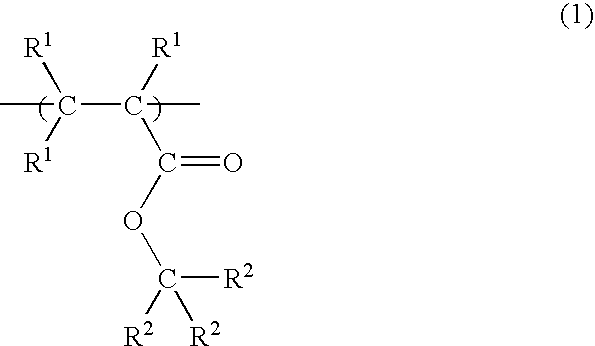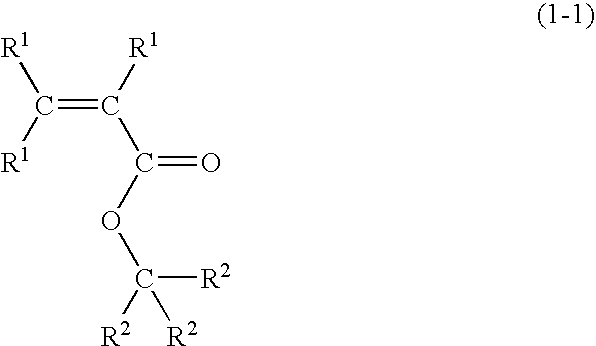Radiation-sensitive resin composition
a technology of radioactive resin and composition, which is applied in the direction of photosensitive materials, microlithography exposure apparatus, photomechanical equipment, etc., can solve the problem of device design fatal defect, reduce the ratio of mw/mn, reduce and reduce the fluctuation in the molecular weight distribution of acid-labile group-containing resin.
- Summary
- Abstract
- Description
- Claims
- Application Information
AI Technical Summary
Benefits of technology
Problems solved by technology
Method used
Image
Examples
synthesis example 1
[0159]
[0160]42.87 g (40 mol %) of a compound (S1-1) and 57.13 g (60 mol %) of a compound (S2-1) were dissolved in 200 g of toluene. A 1,000 ml three-necked flask charged with 100 g of toluene, 2.71 g of 2-hydroxyethyl 2-bromopropionate, 10.63 g of chloroindenylbis(triphenylphosphine)ruthenium, and 2.38 g of pentamethyldiethylenetriamine was purged with nitrogen for 30 minutes. After nitrogen purge, the flask was heated to 110° C. while stirring and the above monomer solution was added dropwise using a dropping funnel over three hours. The polymerization reaction was carried out for 48 hours after initiation of dropping. After completion of polymerization, the polymer solution was cooled with water to 30° C. or lower and poured into 2,000 g of methanol. White precipitate produced was collected by filtration. The white powder collected by filtration was washed twice with 400 g of methanol in a slurry state, filtered again, and dried for 17 hours at 50° C. to obtain a white resin powde...
synthesis example 2
[0161]
[0162]42.87 g (40 mol %) of a compound (S1-2) and 57.13 g (60 mol %) of a compound (S2-2) were dissolved in 200 g of toluene. A 1,000 ml three-necked flask charged with 100 g of toluene and 2.86 g of ethyl 2-methoxythiocarbonylsulfanylpropionate was purged with nitrogen for 30 minutes. After nitrogen purge, the flask was heated to 110° C. while stirring and the above monomer solution was added dropwise using a dropping funnel over three hours. The polymerization reaction was carried out for 48 hours after initiation of dropping. After completion of polymerization, the polymer solution was cooled with water to 30° C. or lower and poured into 2,000 g of methanol. White precipitate produced was collected by filtration. The white powder collected by filtration was washed twice with 400 g of methanol in a slurry state, filtered again, and dried for 17 hours at 50° C. to obtain a white resin powder (75 g, yield 75%). The resin was a copolymer with a Mw of 7,000, Mw / Mn ratio of 1.28,...
synthesis example 3
[0163]
[0164]42.87 g (40 mol %) of a compound (S1-3) and 57.13 g (60 mol %) of a compound (S2-3) were dissolved in 200 g of toluene. A 1,000 ml three-necked flask charged with 100 g of toluene and 3.34 g of methyl 2-(2,2,6,6-tetramethyl-piperidin-1-yloxy)-propionate was purged with nitrogen for 30 minutes. After nitrogen purge, the flask was heated to 110° C. while stirring and the above monomer solution was added dropwise using a dropping funnel over three hours. The polymerization reaction was carried out for 48 hours after initiation of dropping. After completion of polymerization, the polymer solution was cooled to 30° C. or lower and poured into 2,000 g of methanol. White precipitate produced was collected by filtration. The white powder collected by filtration was washed twice with 400 g of methanol in a slurry state, filtered again, and dried for 17 hours at 50° C. to obtain a white resin powder (80 g, yield 80%). The resin was a copolymer with a Mw of 7,800, Mw / Mn ratio of 1....
PUM
 Login to View More
Login to View More Abstract
Description
Claims
Application Information
 Login to View More
Login to View More - R&D
- Intellectual Property
- Life Sciences
- Materials
- Tech Scout
- Unparalleled Data Quality
- Higher Quality Content
- 60% Fewer Hallucinations
Browse by: Latest US Patents, China's latest patents, Technical Efficacy Thesaurus, Application Domain, Technology Topic, Popular Technical Reports.
© 2025 PatSnap. All rights reserved.Legal|Privacy policy|Modern Slavery Act Transparency Statement|Sitemap|About US| Contact US: help@patsnap.com



